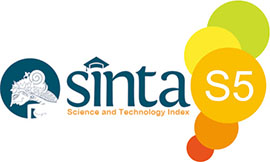Tren Global Microlearning di Pendidikan Tinggi: Analisis Bibliometrik (2013–2023)
 ), Rudi Susilana(2), Mario Emilzoli(3),
), Rudi Susilana(2), Mario Emilzoli(3), (1) Universitas Pendidikan Indonesia
(2) Universitas Pendidikan Indonesia
(3) Universitas Pendidikan Indonesia
 Corresponding Author
Corresponding Author
DOI : https://doi.org/10.24036/et.v11i2.126040
Full Text:
 Language : id
Language : id
Abstract
This study explores the micro-learning research landscape in the context of higher education using bibliometric analysis. A total of 44 published and relevant papers in peer-reviewed journals and conferences from the 2013-2023 period were taken from the Scopus database. This study highlights the number of publications and citations, subject areas, affiliations, universities, countries, and the most productive and influential researchers. Apart from that, this research also identifies research topics that researchers have been working on in recent years. The findings show that publications and citations have increased starting in 2017. Spain and the United States are the most productive countries on this topic. 146 authors were involved in this research. Alin, Sîrbu Nicușor are the most productive researchers, while the most influential writer is Díaz-Redondo Rebeca, who is affiliated with the Escola de Enxeñaría de Telecomunicación, Campus Universitario (Spain). There are 5 universities that contribute the most, publishing the same amount for each university, one of which is the University of Craiova (Romania). The network visualization co-authorship map shows the absence of collaboration between authors researching micro-learning in the context of higher education. Keywords such as "adult learner", "MOOC", "video" and 'effectiveness" are keywords related to micro-learning with low intensity, this opens up opportunities to carry out research and opens up opportunities for collaboration, because this topic is still very popular. wide area for research.
Keywords: Micro-Learning, Higher Education, Bibliometric Analysis
References
Al-Jamimi, H. A., BinMakhashen, G. M., & Bornmann, L. (2022). Use of bibliometrics for research evaluation in emerging markets economies: a review and discussion of bibliometric indicators. Scientometrics, 127(10), 5879-5930.
Alqurashi, E. (2018). Creating a microlearning environment to facilitate retention of information: a three-step approach. Proceedings of the 41st Annual AECT, Kansas, United States.
Anderson, M. H., & Lemken, R. K. (2023). Citation context analysis as a method for conducting rigorous and impactful literature reviews. Organizational Research Methods, 26(1), 77-106.
Baas, J., Schotten, M., Plume, A., Côté, G., & Karimi, R. (2020). Scopus as a curated, high- quality bibliometric data source for academic research in quantitative science studies. Quantitative science studies, 1(1), 377-386
Bothe, M., Renz, J., Rohloff, T., & Meinel, C. (2019, April). From MOOCs to micro learning activities. In 2019 IEEE Global Engineering Education Conference (EDUCON) (pp. 280-288). IEEE.
Brebera, P. (2017, October). Microlearning in Foreign Language Courses: A Threat or a Promise?. In European Conference on e-Learning (pp. 85-93). Academic Conferences International Limited.
Buchem, I., & Hamelmann, H. (2010). Microlearning: a strategy for ongoing professional development. eLearning Papers, 21(7), 1-15.
Chang, J., & Liu, D. D. (2015, May). Design and application of micro-learning video in flipped classroom. In 2015 International conference on Applied Science and Engineering Innovation (pp. 1290-1293). Atlantis Press.
Cheng, Z., Richardson, J. C., & Newby, T. J. (2020). Using digital badges as goal-setting facilitators: A multiple case study. Journal of Computing in Higher Education, 32, 406- 428.
De Gagne, J. C., Park, H. K., Hall, K., Woodward, A., Yamane, S., & Kim, S. S. (2019). Microlearning in health professions education: scoping review. JMIR medical education, 5(2), e13997.
De Gagne, J. C., Woodward, A., Park, H. K., Sun, H., & Yamane, S. S. (2019). Microlearning in health professions education: a scoping review protocol. JBI Evidence Synthesis, 17(6), 1018-1025.
Deng, S., & Xia, S. (2020). Mapping the interdisciplinarity in information behavior research: a quantitative study using diversity measure and co-occurrence analysis. Scientometrics, 124, 489-513.
Díaz Redondo, R. P., Caeiro Rodríguez, M., López Escobar, J. J., & Fernández Vilas, A. (2021). Integrating micro-learning content in traditional e-learning platforms. Multimedia Tools and Applications, 80, 3121-3151.
Djeki, E., Dégila, J., Bondiombouy, C., & Alhassan, M. H. (2022). E-learning bibliometric analysis from 2015 to 2020. Journal of Computers in Education, 9(4), 727-754.
Donthu, N., Kumar, S., Mukherjee, D., Pandey, N., & Lim, W. M. (2021). How to conduct a bibliometric analysis: An overview and guidelines. Journal of business research, 133, 285-296.
Gill, A. S., Irwin, D. S., Ng, R. Y. K., Towey, D., Wang, T., & Zhang, Y. (2020, December). The future of teaching post-COVID-19: Microlearning in product design education. In 2020 IEEE international conference on teaching, assessment, and learning for engineering (TALE) (pp. 780-785). IEEE.
 Article Metrics
Article Metrics
 Abstract Views : 205 times
Abstract Views : 205 times
 PDF (Bahasa Indonesia) Downloaded : 94 times
PDF (Bahasa Indonesia) Downloaded : 94 times
Refbacks
- There are currently no refbacks.





